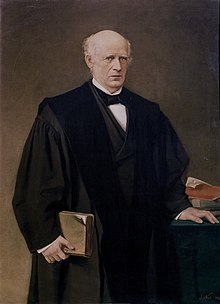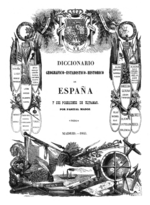Pascual Madoz
Pascual Madoz | |
|---|---|
 | |
| Prime Minister of Spain | |
| In office 30 September 1868 – 3 October 1868 | |
| Monarch | Vacant |
| Preceded by | Jose Gutierrez de la Concha |
| Succeeded by | Francisco Serrano |
| Personal details | |
| Born | Pascual Madoz Ibáñez 17 May 1806 Pamplona, Kingdom of Spain |
| Died | 13 December 1870 (aged 64) Genoa, Kingdom of Italy |
| Resting place | Montjuïc Cemetery |
Pascual Madoz Ibáñez (17 May 1806 – 13 December 1870) was a Spanish politician and statistician.
Biography
[edit]
In early life Madoz was settled in Barcelona, as a writer and journalist. He envisioned the construction of the Vielha tunnel. He joined the Progresista party formed during the First Carlist War, 1833–40. He saw some service against the Carlists; was elected deputy to the Cortes of 1836; took part for Baldomero Espartero, Count of Luchana, and then against him; was imprisoned in 1843; went into exile and returned; was governor of Barcelona in 1854, and minister of finance in 1855; had a large share in secularizing the Church lands; and after the revolution of 1868 was governor of Madrid. He had, however, no great influence as a leader and soon went abroad, dying at Genoa in 1870.[1] He was later interred in the Montjuïc Cemetery in Barcelona.
Madoz was distinguished from most of the politicians of his generation by the fact that in mid-life he compiled what is still a book of value: a geographical, statistical and historical gazetteer or dictionary of localities in Spain and its overseas possessions, Diccionario geográfico, estadístico y histórico de España, y sus posesiones de Ultramar (Madrid, 1848–1850).[1]
Public recognition
[edit]In Pamplona there is a street, Calle de Pascual Madoz, named in his honor.
Notes
[edit]- ^ a b Chisholm 1911, p. 288.
References
[edit]- This article incorporates text from a publication now in the public domain: Chisholm, Hugh, ed. (1911). "Madoz, Pascual". Encyclopædia Britannica. Vol. 17 (11th ed.). Cambridge University Press. p. 288.
